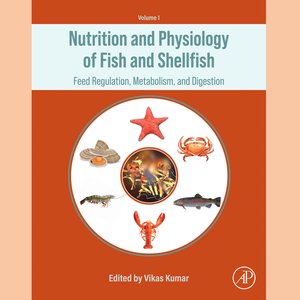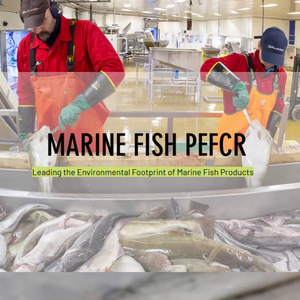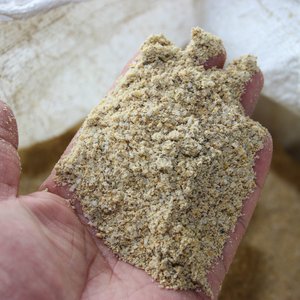This week's news stories from Growfish
'SmartTag' technology can measure the well being of the fish
New technology makes it possible to measure whether fish is thriving in the fish farm. A small device on the fish registers its breathing activity, showing whether it is stressed, according to fiskeriforskning.no.
How the fish is doing can now be monitored, something which is becoming increasingly important with increased emphasis on animal welfare.
The project is part of the EU-financed research programme SEAFOODplus, and started by Fiskeriforskning to document how the fish reacts to the environment in the fish farm. The company Thelma in
Testing and development of the equipment for use on cod has been carried out this autumn. The technology will initially be used in research work.
The equipment makes it possible to measure how often and how much the pressure changes in the mouth, and with that, the cod's breath. From a box on its back, audio signals are sent to an underwater microphone, which sends the sound to a computer. There, a programme calculates the breathing activity.
Source: Fish Update
Related URL: http://www.fishupdate.com
Tainted
Yoo Soh-jung
The latest findings of risky agricultural and fisheries products imported from
Detection of unusually high amounts of lead in Chinese-made kimchi, the traditional Korean spicy cabbage side dish, as well as chemicals in tea and seafood like eel, prompted President Roh Moo-hyun last week to order government agencies to cooperate closely to adopt measures to enhance food safety.
"This matter cannot be resolved by only the Korean government taking stronger inspection and quarantine measures, or by banning such imports from
But Jee stressed that the Chinese government needs to tighten inspection procedures and quarantine measures, noting that the Chinese would also benefit since they consume the same foods.
The Ministry of Maritime Affairs and Fisheries recently called on the Chinese government to halt all exports of its freshwater aquaculture products after malachite green was found in freshwater fish, as well as saltwater-farmed skate and drum fish, imported from
He added that at the non-government level, China-based private companies need to take a more responsible role in watching over the quality and safety of the goods they export. This means Korean importers would also need to be vigilant and more responsible.
The head of the KIEP China research team also questioned the practicality of the Korean government's efforts.
"As much as the government wants to toughen up inspection and screening procedures, it's not realistic because manpower is limited," Jee said.
Yang Pyoung-seob, a researcher for the Korea International Trade Association's East Asian Survey and Forecast Team, called for greater efforts by the country's largest trade partner to improve the quality of its goods.
"
Imports from the world's fastest growing economy have been growing rapidly in the past several years because of their lower prices catering to increasingly price-sensitive consumers. The relocation of Korean manufacturing plants to
Trade experts say it would be difficult to ban Chinese products because the large volume and wide range of cheap imported agro-fisheries products, and processed foods, would deal a great blow to the Korean economy. Many restaurants and food-related businesses rely on the cheaper products.
Between Jan. and Aug. this year, imports of kimchi, the Korean staple dish, totaled $31.09 billion, a 118.7 percent surge from a year ago, according to the Korea International Trade Association. Shipments of crab, which has also had a history of metal contamination, rose 35.1 percent during the same period to total $28.3 billion.
So far, a blow to trade relations does not look imminent.
"It also wouldn't be easy to replace these imports with other ones," said Yang. "So far, Koreans have been satisfied with what they can get for the low prices."
Kwon Young-sup, an official specializing in Korea-China trade relations at the Ministry of Foreign Affairs and Trade, said the latest series of discoveries are not enough to upset bilateral relations.
"The issue over the quality of Chinese goods has been around for a while now, and it's not yet big enough to hurt or change Korea-China trade relations," said Kwon. He stressed the latest incidents of contaminated food are to be handled by the Agriculture Ministry by improving measures for inspection and quarantine.
Yang believes it would be a chance for
"It's a chance to build trust with Korean consumers. In the meantime, our country needs to continue to be picky, since it deals with food safety," he said. The trade expert noted that the latest stream of discoveries of hazardous Chinese imported edibles reflects improved government crackdown efforts.
Trade with
The poor reputation of products from
The Agriculture Ministry has also stepped up measures to stop such illegal practices.
Lawmakers criticize encouraging use of toxic chemicals, slow response
Kwon Ji-young
The government has been encouraging fish farmers to use a toxic chemical to treat sick crabs and shrimps, a lawmaker claimed yesterday.
The statement came as the government grapples with public uneasiness about food safety stirred by a report last week that domestically farmed fish is contaminated with a carcinogen called malachite green.
In technological support manuals for crab farmers in 2005, and shrimp farmers in 2000, the government encouraged them to use malachite green to treat ailments or infections of crab and fish, Uri Rep. Kim Woo-nam said during a parliamentary audit session for the Ministry of Maritime Affairs and Fisheries.
"(The ministry) encourages shrimp and crab farms to use malachite green, but doesn't bother to monitor those farms," said Kim.
Last Thursday, the ministry reported that traces of malachite green were found in freshwater fish in 34 fish farms across the country during an inspection from Sept. 15 through Oct. 3. In July, malachite green was also found in fish imports from
Malachite green is a synthetic antiseptic commonly used in fish tanks to protect fish from decay or if they become wounded. Malachite green was found in the 1980s to be a cancer-causing substance, and has been banned from use on foods since the early 1990s.
The government has stopped shipments of fish from all farms across the nation starting last Thursday.
Lawmakers also criticized the government for belated response to the fish crisis. They accused the ministry of announcing the contamination 15 days after it was discovered on Sept. 20-21.
Some legislators urged the ministry to purchase all the domestic freshwater fish being banned from commercial distribution nationwide to compensate the farmers who are suffering the biggest losses from the government's contradictory policies.
A fish farmers' coalition rallied in front of the ministry pressing the government to establish countermeasures for fish farmers.
In a petition to the government, they claimed "malachite green is a chemical that the Maritime Ministry has encouraged fish farmers to use," and "the government is now trying to pass all responsibility onto fish farmers."
They urged the government to buy out all contaminated fish found in these inspections and promote uncontaminated fish in order to revive the fish industry which faces incredible losses from the current fish scare.
Earlier in the day, the government and the Uri Party unveiled plans to conduct wide-scale inspections on all fish farms nationwide and strengthen equipment and manpower to monitor marine products.
The decisions were made during consultations between the government and ruling Uri Party at the National Assembly to discuss specific countermeasures for ensuring the safety of fisheries products. Minister of Maritime Affairs and Fisheries Oh Keo-don attended the meeting.
The government and Uri also agreed to add more antibiotics onto the list of chemicals which are monitored by government-set standards for acceptable amounts used in fish farms.
There are currently four antibiotics monitored by the government, but this will be increased to 10.
For those farms that turn up free of contaminated fish in further inspections, the government plans to compensate the losses they suffer from banned shipments of fish.
The compensation will be taken from a development fund for marine products, as agreed to in the consultations.
Source:
Related URL: http://www.koreaherald.co.kr
Worried mussel farmers raise cash to fight squirt
Kate Tringham
The Mussel Industry Council has approved spending $50,000 to assess the impact of the sea squirt which is threatening
Biosecurity New Zealand last week announced that the sea squirt from
However, the aquaculture industry has called for immediate action to eradicate the pest, which has caused damage worldwide as it competes for food with shellfish like oysters and mussels, and eats their larvae.
Mussel Industry Council (MIC) executive officer Lorna Holton said little was known about the sea squirt in
"The executive committee has recommended that the board used all of its new project funding to look at the practical management of eradication of the sea-squirt, and this is a reflection of how seriously it could impact on our industry," she said.
"It is Biosecurity NZ's role, but the industry considers the issue so important that we just have to go ahead and do something straight away."
The research committee will meet on October 21 to decide what direction to take with the funding.
They had known for at least six weeks, he said.
"We have very good monitoring systems in place and all sorts of things, and at this stage the most important thing is to see if we can find it here," he said.
"We're a pretty resilient industry and we've battled all sorts of things in the past.
"We're lateral thinkers, and if the problem presents itself here, we'll have to overcome it. But generally, it's pretty hard to eradicate something that's in the sea."
Biosecurity NZ said that after initial surveys were conducted to determine the spread of the sea squirt in
Marlborough District Council environment committee chairman Gerald Hope said the council was aware of the potential for unwanted pests to enter the Marlborough Sounds.
A sea squirt considered to be a native found at
The council would work in conjunction with Biosecurity NZ on such an issue, as the cost of it would be far beyond what the ratepayer would be able to pay, Mr Hope said.
Mr Hope said the council would be "very sensitive" about movements of boats between
He urged people to be responsible about the issue.
"We're protected by the sea but we can also be invaded by the sea," he said.
http://www.stuff.co.nz
Call for greening of
Brian O'Riordan
A seminar on the sustainability of the Peruvian anchovy fisheries was recently organised in
According to the Chile Pesquero news service, the meeting was organized with the collaboration of the
However, the Peruvian fishmeal and oil industry has a chequered past and a dirty image to deal with. Following the El Nino of 1998, the overcapitalized fish industry crashed and banks were forced to intervene and bail out the industry. Lacking effective control measures, the industrial fishing fleet also stands accused of indiscriminate use and depletion of
The meeting was intended to start an international dialogue with the aim of agreeing on a workplan that will seek to establish the sustainability of the anchovy industry. Included in the agenda were discussions on establishing criteria for social and economic impact assessment, and developing better ways for incorporating scientific and technical knowhow into the systems currently used for managing the anchovy resources.
The seminar also considered the scope and relevance of applying an ecosystem approach to the exploitation of anchovies, where support from the Peru-Chile project on the Integrated Management of the Humboldt Current Large Ecosystem should be considered.
The Peruvian government proposes to design an action plan for the anchovy fishery, in line with the Johannesburg Declaration on Sustainable Development, and the values, principles and norms of the FAO Code of Conduct for Responsible Fisheries.
Source or related URL: http://www.icsf.net







